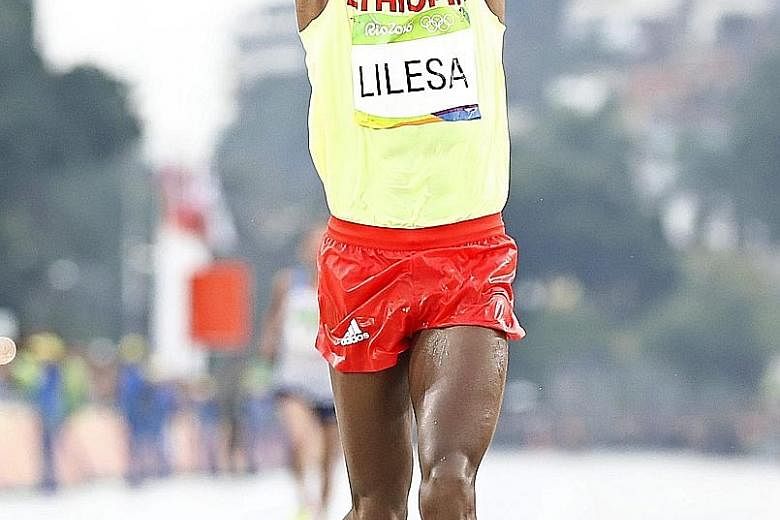NAIROBI • One day after winning silver in the Olympic marathon, Feyisa Lilesa faced a much different decision than other medallists: Would it be safe for him to return home to Ethiopia?
As he finished the race on Sunday, Lilesa held his arms above his head in an "X" - a sign of protest used against the Ethiopian government for its persecution of the Oromo ethnic group.
The 26-year-old took a brave stand, and at a news conference, it was clear he knew the price he might have to pay.
"If I go back to Ethiopia, maybe they will kill me," he said. "If not kill me, they will put me in prison. I have not decided yet, but maybe I will move to another country."
On Monday, faced with an avalanche of international attention, the Ethiopian government said it would not punish Lilesa upon his return.
"Though it is impossible to express a political stance at Olympic Games, the athlete will be welcomed while returning home along with other members of the Ethiopian Olympic squad," Getachew Reda, a government spokesman, told one of Ethiopia's state broadcasters.
But Ethiopians - particularly members of the diaspora - were deeply concerned for his safety.
On one fundraising website, people donated more than US$40,000 (S$53,960) in 15 hours to Lilesa's cause.
"Feyisa Lilesa faces persecution if he goes back to Ethiopia and he has decided to seek asylum," wrote the fundraisers. "Funds are needed to support him and his family in the meantime."
Lilesa could not be reached and his agent declined to comment.
Despite Reda's promise that Lilesa would be welcomed back, there has been almost no mention of Lilesa's marathon performance in the state media's Olympics reports.
Ethiopia's runners are among the country's biggest celebrities.
When its first Olympic champion, Abebe Bikila, died, the government called for a national day of mourning.
Haile Gebrselassie, another former champion, is one of the country's richest men.
But younger, less-established runners have complained about persecution at home, seeking asylum when travelling for international meets.
Many say that persecution is linked to their Oromo ethnicity.
"I'd rather commit suicide in America than return to Ethiopia," one runner said last year.
WASHINGTON POST, AGENCE FRANCE-PRESSE

